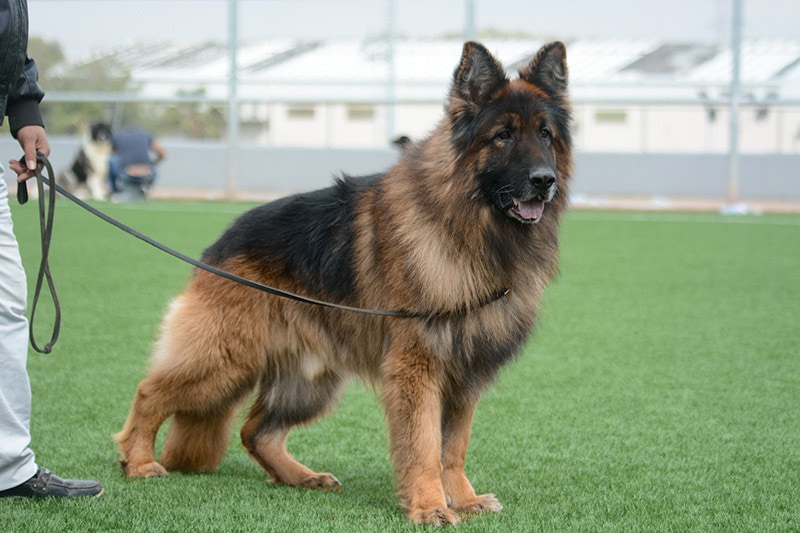20 Dog Breeds Prone To Seizures: Vet Approved Health Guide
By Ashley Bates
Updated on

We can’t always foresee what can go wrong when we bring our puppies home. Our dogs can have numerous oddities crop up, from accidents to health issues. Our job is to prepare for anything we might encounter along the way to care for our canines the best we can.
Seizures can happen to any dog based on several factors. However, some breeds are genetically predisposed to idiopathic epilepsy. This form of epilepsy usually affects young to middle aged dogs and no underlying cause for the seizures can be found. As this form of epilepsy is believed to be partly due to genetic factors, some families and breeds are at an increased risk of developing it.
So, what breeds fall on the list for a tendency to epilepsy? And what can you do to prepare? Here are 20 dog breeds that could face the problem.
The 20 Dog Breeds Prone To Seizures
1. Beagles

Beagles warm our hearts with their sweet personalities. It’s no wonder they are one of the most popular dogs to exist. Originally, these pups were hunting dogs with the vocals to prove it, but they have taken a much more domestic role over time.
Beagles are usually healthy dogs with few issues to speak of. However along with epilepsy here are other health issues they can be more prone to:
- Cherry eye
- Hypothyroidism
- Luxating patella
- Obesity
- Ear infections
- Dental disease
2. Bernese Mountain Dogs

Bernese Mountain Dogs definitely get points for being such fantastic companions. But unfortunately, they are another breed that can be at increased risk of developing seizures.
- Hip dysplasia
- Elbow dysplasia
- Certain Cancers
- Bloating- Gastric Dilatation Volvulus (GDV)
- Canine degenerative myelopathy
3. Border Collies

Border Collies are well regarded for their athletic capabilities. These intelligent dogs rank high, usually in the top three, for canine intelligence. In addition to their brains, these dogs make fantastic family companions if they have plenty of exercise and lots to keep them occupied.
While typically very healthy, Border Collies can sometimes have epilepsy.
- Hip dysplasia
- Progressive retinal atrophy
- Collie eye anomaly
- Hypothyroidism
4. Boxers

Boxers are very popular dogs because of their playful and loyal characters. They were originally bred as working dogs and have a lot of energy.
- Hip dysplasia
- Heart disease
- Brachycephalic Obstructive Airway Disease
- Eye ulcers
- Certain Cancers
5. Cocker Spaniels

Cocker Spaniels are cheerful, chipper little dogs with unique appearances and quite a history. They have wonderful temperaments and make perfect additions to growing families or single owners alike. Plus, you can give them some pretty adorable hairstyles to sport around.
- Hip dysplasia
- Earproblems
- Luxating patella
- Allergies
- Hereditary eye disorders
6. Rough Collies

Rough Collies might be quite familiar faces if you know the classics—like Lassie. These even-tempered, graceful dogs have excellent dispositions. They make loving companions for families and they love to have space to roam.
- Hip dysplasia
- Dermatomyositis
- Eye problems
- Heart disease
7. Dachshunds

Dachshunds, or wiener dogs, are charming little sausage-shaped pups with larger-than-life personalities. Even though they were bred to chase badgers and weasels, they weaseled their way into our hearts in the home. These perfect, tiny companions are excellent additions to almost any living situation.
- Hip dysplasia
- Back problems- Intervertebral disc disease
- Luxating patella
- Hypothyroidism
- Diabetes
- Heart disease
- Progressive Retinal Atrophy
8. Golden Retriever

Golden Retrievers are among the most popular dogs in the United States. People are completely smitten by their beautiful personalities and capabilities. Golden Retrievers are one of the primarily selected candidates for service training
However, Golden Retrievers can have seizure disorders like epilepsy along with a laundry list of other health issues.
- Hip dysplasia
- Elbow dysplasia
- Eye problems
- Allergies
- Hypothyroidism
- Ichthyosis
- Aortic stenosis
9. Irish Setters

Irish Setters are beautiful, athletic dogs that make wonderful companions. This vibrant breed has been used as hunting dogs for so long—but has mainly transitioned to indoor home living.
Irish Setters can have seizures and other neurological conditions that can cause tremors, weakness, and imbalance.
- Hip dysplasia
- Hypothyroidism
- Gastric dilatation
- Progressive retinal atrophy
- Entropion
- Von Willebrand disease
10. Irish Wolfhounds

Irish Wolfhounds are among the most massive dogs known to man. These tall, ancient beasts awe onlookers with their unique appearance and elegant grace. Despite their speed, these dogs usually prefer a relaxed lifestyle.
In addition to seizure disorders, Irish Wolfhounds have shorter average lifespans than most breeds and can be susceptible to a number of issues.
- Hip dysplasia
- Elbow dysplasia
- Allergies
- Hypothyroidism
- Osteosarcoma
- Progressive retinal atrophy
- Gastric Dilatation Volvulus
11. Keeshonds

Keeshonds are very vibrant dogs with happy-go-lucky personalities and adventurous attitudes. They are affectionate and make loving family pets.
However, seizures are a possibility. This breed doesn’t suffer as frequently as some of the others we mentioned, but they rank high for epilepsy.
- Hip dysplasia
- Luxating patella
- Eye problems
12. Labrador Retriever

Labrador Retrievers rank as one of America’s most popular dogs—and it’s no wonder. This common breed woos dog lovers with energetic, amiable characters and stunning obedience capabilities. These dogs often fulfill pet and service animal roles.
As well as idiopathic epilepsy ,Labs can also have atypical seizures where, rather than convulsing, they stagger or gaze off aimlessly.
- Hip dysplasia
- Elbow dysplasia
- Allergies
- Obesity
13. Poodles

Poodles are notorious for their intelligence and elegance. This stunning breed is most often recognized in its show coat, parading around with poufs for days. But these flashy pups are quite modest and mellow, in contrast.
- Hip dysplasia
- Addison’s disease
- Luxating patella
- Cataract
- Legg-Calve-Perthes disease
- Cushing’s disease
14. St. Bernard

St. Bernards are one of the giant breeds with hearts equal to their size. These gentle giants are known for being good family dogs but these big guys and gals work best in larger living spaces.
These dogs are prone to seizures, primarily idiopathic epilepsy. Like other dogs with this seizure type, it generally develops between 6 months and 6 years of age.
- Hip dysplasia
- Elbow dysplasia
- Dilated cardiomyopathy
- Osteosarcoma
- Gastric Dilatation Volvulus
- Skin and ear problems
15. German Shepherds

German Shepherds are one of the most popular dogs to exist, and for a good reason. If you’re looking for a loyal, trainable dog, look no further than this beautiful breed. With proper training, these dogs can learn just about any task, from simple to complex.
German Shepherds are at risk of certain conditions and illnesses which are unfortunately more common within their breed. As well as epilepsy these include:
- Hip dysplasia
- Elbow dysplasia
- Allergies
- Exocrine pancreatic insufficiency
- Canine degenerative myelopathy
- Anal furunculosis
- Hemophilia
16. Shetland Sheepdog

Shetland Sheepdogs, or simply “Shelties,” are absolutely charming little dogs that are roughly half the size of their Collie cousins. These pups are social, gentle, and fun, so it’s no wonder many folks choose to add a Sheltie to the family.
- Hip dysplasia
- Luxating patella
- Legg-Perthes disease
- Eye problems
- Hypothyroidism
- Von Willebrand’s disease
17. Siberian Husky

Siberian Huskies are talkative, energetic dogs with a strong pack mentality. They are incredibly loyal to owners and love to exercise and usually suit experienced owners best. These dogs can work in several environments, but they really love the cold—and they’re built to withstand it.
This breed is also prone to seizures. The common form of epilepsy—idiopathic—is responsible for Husky seizures in most cases.
- Hip dysplasia
- Certain cancers
- Eye problems
- Hypothyroidism
- Zinc deficiency
18. English Springer Spaniel

English Springer Spaniels tout lean muscles and sharp minds. These dogs also have webbed feet, making them exquisite swimmers. These working dogs make ideal candidates for advanced training and will love to go on adventures—like hiking.
These athletes have certain health issues, including seizures. These seizures are typically resulting from idiopathic epilepsy and begin sometime before 3 years of age.
- Hip dysplasia
- Elbow dysplasia
- Progressive retinal atrophy
- Ear infections
19. Pembroke Welsh Corgis

Pembroke Welsh Corgis are famous for their amiable nature and adorable appearance. These popular pooches make lovely additions to practically any lifestyle, matching children’s energy, and can work very well for seniors or retirees.
- Hip dysplasia
- Back problems-intervertebral disc disease
- Cataracts
- Von Willebrand’s disease
20. Wire-Haired Fox Terriers

Wire-haired Fox Terriers are highly alert dogs that never miss a beat. They can keep up with active folks and leave you in the dust if you tire easily. While they are fearless, they also make magnificently loyal family additions.
Even though these dogs are athletically inclined as well as epilepsy they can suffer from other problems such as:
- Eye issues
- Luxating patellas
- Legg-Perthes disease
- Allergies
What Are Seizures?
Seizures, sometimes called ‘fits’, are due to a brain disorder which causes a dog to lose control of their body. Seizures can vary in how they look , some can be focal muscle twitching while others can cause collapse and paddling movements of the legs.
As well as idiopathic epilepsy, which has a genetic basis, seizures can also be caused by poisons, illness and injury such as head trauma.Sometimes, a seizure might happen once and then no more. Other times, it can turn into a disorder that requires Investigation and treatment. Speak to your vet if your dog has had a seizure.
Importance of Pet Insurance
When you bring your dog or puppy home, you must decide whether you will opt for pet insurance. Pet insurance is an up-and-coming layer of protection for your canine companion. While policies range and coverage, policies generally cover accidents and emergencies.
Most insurance policies don’t cover pre-existing conditions, so it’s important to get pet insurance sooner rather than waiting until something such as seizures comes up. If you wait until after seizures develop to get pet insurance, the policy may not cover treatment for the seizures.
Conclusion
So, now you know what breeds may be more prone to having seizures. While this can be more common among these breeds, it of course doesn’t necessarily mean they will have seizures.
If you think your dog may have had a seizure, contact your vet immediately. If you just want information before getting a specific breed, remember to shop for pet insurance that covers issues like seizures to get the coverage in case it’s ever a problem.
Featured Image Credit: JSKphotog, Shutterstock













